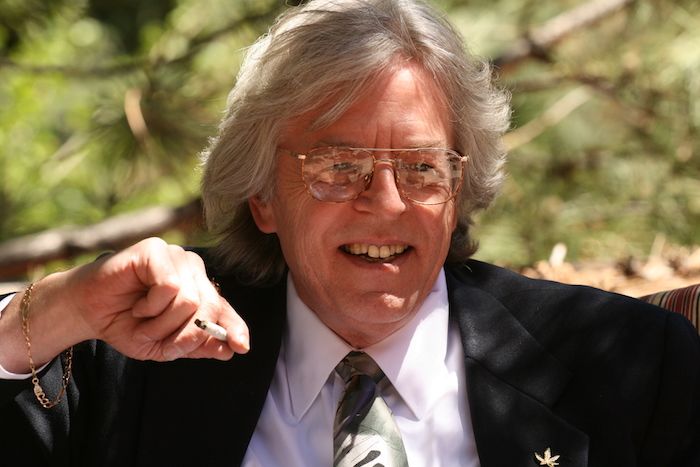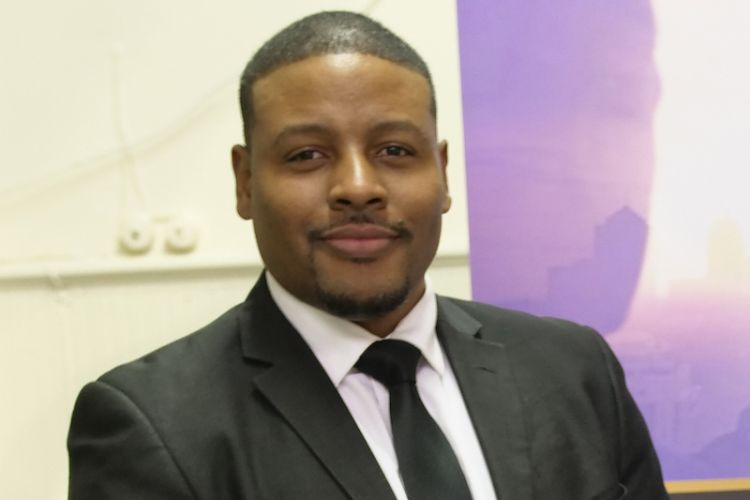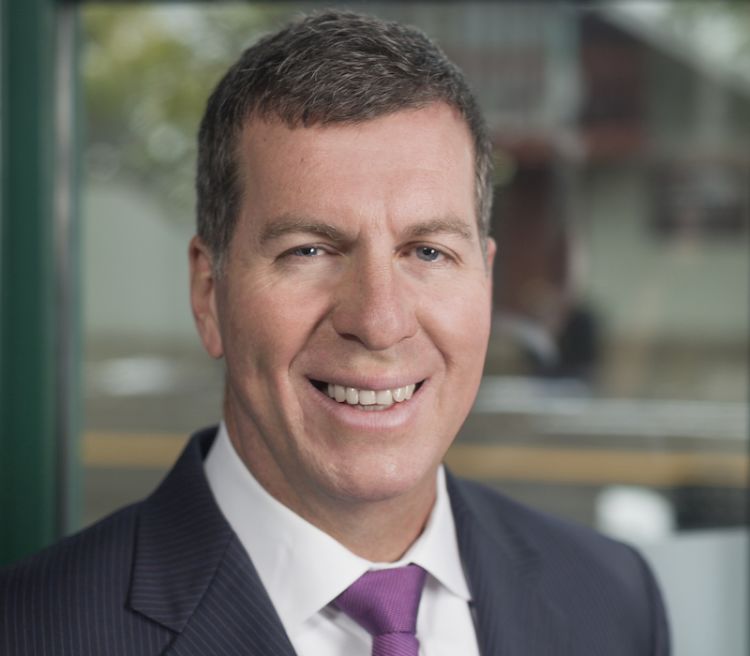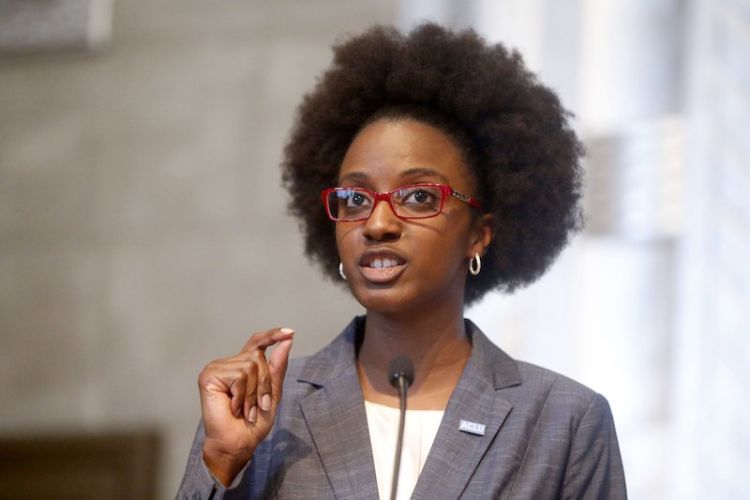National - (833) 977-2537
ObsidianIN THE NEWS
 NEWS
NEWS
 PRESS RELEASES
PRESS RELEASES
FOR MEDIA INQUIRIES & SPEAKING ENGAGEMENTS:
media@obsidianinvestment.net
609-359-7998
AC Native LaQuay LaunJuel Spreads Wings With Obsidian Elite
FRNJ 11.2019
SENEGAL – LaQuay LaunJuel grew up humbly in Atlantic City’s Pitney Village, but it has led the Marines veteran to the western African coast, co-owning an investment company and opening an international plant extraction business.
Juel, co-owner of the New Jersey-based Obsidian Elite Investment Association with Tammeisha Smith, said he hopes the business can help lead others to financial freedom and wealth.

Investment Association aims to help minority community profit from legal cannabis
ROI 02.2018
The echoes of many New Jersey investors can be heard when LaQuay L. Juel talks about potential for the state’s cannabis industry to be a windfall. But the acoustics are different when he speaks of there being an extreme dearth of African-Americans sharing in those profits. “A lot of people don’t talk about it,” he said. “But, of the 5,000-plus legal marijuana business licenses awarded nationwide, only something like five were awarded to African-Americans for retail sales.

Stockton University - New Jersey
Obsidian Elite Participates in Stockton Cannabis Minor Program Creation
Proposal for an Interdisciplinary Minor in Cannabis Studies
Date: 03.2018
Title: Cannabis Studies
Contacts: Ekaterina Sedia (BIOL) and Carra Hood (Assoc. Provost)
Focus: This minor provides students with a generalist knowledge of medical/recreation marijuana research, foundational knowledge of marijuana-related legal and policy issues, and an overview of the cannabis industry from a combination of legal, business, and healthcare perspectives.
Academic Home: General Studies
First Offered: Fall 2018
Rationale and Demand:
The interdisciplinary minor in Cannabis Studies offers students a foundation for understanding the
burgeoning cannabis industry. New Jersey is among the 29 states and the District of Columbia that
currently have legal medical marijuana. In addition, 9 states also have legal recreational marijuana. As a
result of the swift growth in medical and recreational marijuana and the impending debates regarding
legalization of recreational marijuana in New Jersey, Stockton students may find the marijuana industry
an attractive one to enter after graduation. The minor will expose students to some of the types of
employment they might pursue.

Experts Weigh In On Wide Variety of Topics Related to Cannabis
ROI 03.2018
A panel of experts at ROI-NJ’s recent interactive panel discussion, “The State of Cannabis II: Understanding the Logistics of Cannabis,” shared their insights on a variety of cannabis industry-related topics.
The panelists: Randy Eigen, first vice president, CBRE; Bill Caruso, attorney, Archer & Greiner P.C.; and LaQuay Laun Juel, president, general partner, Obsidian Elite Investment Association.

Investment Firm Fights to Make Sure Urban Community Gets Piece of Cannabis Action
ROI 03.2018
LaQuay Laun Juel is passionate about making sure the urban African-American community gets a fair shot at profiting from the cannabis industry for one simple reason: It already is.
Juel, speaking at ROI-NJ’s recent interactive panel discussion, “The State of Cannabis II: Understanding the Logistics of Cannabis,” said the community is an active participant when it comes to distribution and use.
“The language in Sen. (Nicholas) Scutari’s bill was very light when it came to minority participation, and considering the amount of damage that has been done by the war on drugs on our community, and the Latino community, for us not to participate is unacceptable,” he said.

Want to get into cannabis game?
Working with local officials should be the first step
ROI 03.2018
While New Jersey officials keep an eye on the mood in Washington, D.C., while figuring out the best way to proceed with legislation involving cannabis, experts say entrepreneurs looking to get into the game need to pay closer attention to municipal government. So said Bill Caruso, an attorney and advocate on the cannabis industry for Archer & Greiner P.C. Caruso is recognized as a thought leader and major influencer in the industry. “One area we’re losing the battle right now is...

Legalizing marijuana could bring increased demand for warehouse space
ROI 03.2018
For all the talk about the potential revenue that could come from growing and distributing cannabis in the state if it were legalized — and it is hefty — that is just one part of the business puzzle. Perhaps lost in the discussion about how to legalize it (just for medicinal use, or for everything?) and how to sell it (small, independent entrepreneurs with a nod to social equality, or big companies?) comes the connective logistical pieces that have great value, too.

NJ Cannabis Insider - Power Players
Things are picking up and Insiders are packing events.
Issue 2 - 03.2018

It has been a whirlwind of events this past week, with cannabis industry gatherings taking place in New York’s financial district and West Orange, and, of course, within the booze-filled Acela cars to the District of Columbia.
The Marijuana Business Association packed in attendees on Monday, Feb. 26, at the The Blinc Group’s office on Fulton Street in Manhattan for a networking and informational session focused on vaping technology. Among the attendees were Blinc Group managing partner Iggy Vatelman, MJBA founder Dave Rheins, MJBA spokesman Stu Zakim, cannabis operations consultant Brian Staffa, CannaContent CEO Stella Morrison, CannaGather founder Josh Weinstein, Marcum LLP partner Gary Rosen, Cohn Reznick partner David DiFusco and Cohn Reznick manager Melissa Goldman.
Arnaud Dumas de Rauly, co-founder of the group, gave a remote vaping presentation from Berlin, Germany, where he formally accepted the chairmanship of the International Standards Organization (ISO) vaping group.
ROI-NJ held its second cannabis business event on Wednesday, Feb. 28, where ROI moderator Tom Bergeron engaged a panel comprised of Bill Caruso, of Archer Law, CBRE first vice president of brokerage services Randy Eigen and Obsidian Elite Investment Association president LaQuay Juel, on logistics in the cannabis space.

LaQuay L. Juel
Morrison and DiFusco also attended this event, along with New Jersey Marijuana Retailers Association president Juan Carlos Negrin, NJMRA director Lorna O’Hara, NJMRA spokesman Tom Skevin, Rick Frimmer of EisnerAmper, Bill Pascrell III, with Princeton Public Affairs Group and the son of U.S. Rep. Bill Pascrell, Jr., and Harry Carpenter and Marilyn Garcia of Citrin Cooperman.
Attendees of the New Jersey Chamber of Commerce’s annual trip with legislators, lobbyists and business professionals said there were fewer faces than in years past, but plenty of operators involved in cannabis lobbying. Headliners at the dinner included Gov. Phil Murphy and U.S. Sens. Cory Booker and Robert Menendez.

Scott Rudder
Among the cannabis set were Caruso, who sat among the collected dignitaries on stage, Negrin, with the New Jersey Marijuana Retailers Association, New Jersey Cannabis Industry Association president Hugh O’Beirne, NJCIA executive director Dara Servis, New Jersey CannaBusiness Association president Scott Rudder, NJCBA deputy executive director MaryLou Pardey and social justice advocate Jay Lassiter.
Assemblywoman Annette Quijano (D-20), who recently attended the NJCIA’s fact-finding trip to Las Vegas, indicated she was working on legislation focused on protecting the in-state rights of out-of-state medical cannabis patients.

Assemblywoman Annette Quijano, right, speaks to Assemblyman Tim Eustace, left, and
Michael Stuetz prior to the annual N.J. Chamber of Commerce train ride to Washington.
State Sen. Robert Gordon (D-38) said he’d heard many concerns from residents about the possible legalization of cannabis, but indicated he still needed to learn more about the issue. Other legislators who engaged on the topic included state Sen. Joseph Cryan (D-20), Assemblyman Bob Andrzejczak (D-1), Assemblywoman Annette Chaparro (D-33) and Morris County freeholder and Burton Trent vice president Tom Mastrangelo.
View Original Article on NJ Cannabis Insider ...
NJ Cannabis Insider - Power Players
NORML founder added to lineup for March 29 symposium.
Issue 4 - 03.2018

The Marijuana Business Association had announced that Keith Stroup, the founder of NORML, will be a speaker at the New Jersey Cannabis Symposium on March 29 at NJPAC in Newark. As part of his address, Stroup will unveil an initiative NORML is offering to attorneys who handle clients in the cannabis space — the NORML Legal Committee dedicated to cannabis business law matters. The event begins at 4 p.m.

Keith Stroup
ROI-NJ held its third cannabis business event on Wednesday, March 14. Moderator Tom Bergeron, ROI’s Editor and Chief Content Office, engaged a panel comprised of Mark Sever, of Archer Law, Terra Tech general counsel Joseph Segilia, New Jersey Cannabis Coalition co-founder and president of the New Jersey chapter of Minorities for Medical Marijuana Leo Bridgewater and Obsidian Elite Investment Association president LaQuay Juel on Pharma 2.0: Navigating the Medical Marijuana Landscape.
Attendees included New Jersey Marijuana Retailers Association spokesman Tom Skevin, Dan McKillop of Scarinci Hollenbeck, CohnReznick partner David DiFusco, New Jersey Cannabis Industry Association communications adviser Jacqueline Ferraro, Christian Nunez of 365 Cannabis, Insurance Office of America senior vice president Paul Smith, and Harry Carpenter and Marilyn Garcia of Citrin Cooperman. Kris Krane, co-founder and president of 4Front Ventures, was scheduled to speak, but was snowed in in Boston.

LaQuay Juel
And, of course, Gov. Phil Murphy held his first budget address on March 13. Murphy pushed for legalization of cannabis in New Jersey by Jan. 1, 2019 — effectively acknowledging the political reality on the ground by backing off of his campaign pledge of legalization within the first 100 days. State Sen. President Stephen Sweeney, D-Gloucester, favors legalization in New Jersey and earlier this month effectively ended a push by some Democrats to decriminalize — as a roadblock to legalization. Sweeney — as many noted — stood and applauded Murphy’s proposal.
View Original Article on NJ Cannabis Insider ....
NJ Cannabis Insider
Issue 7 - 04.2018

LAQUAY LAUN'JUEL

LaQuay Juel is president of Obsidian Elite Investment Association
Q: Why are the capital requirements so high to enter the cannabis space?
A: The perspective the state is taking is akin to the process of obtaining a liquor license. First, it is the disqualification of felons, a routine aspect of N.J. governmental culture — not that we agree. Secondly, it’s by establishing fees based on cost to conduct a forensic background check and review of their application and full business plan. The third factor is a purposeful projection that candidates must show a “vested” interest and propensity for success. Is this necessary? That’s a matter of perspective and is a reflection of the type of industry N.J. wishes to foster. Right now, the model seems geared toward large-scale operations and not the medium level or small-business models that could work just as effectively or better in N.J.
Q: How is Obsidian Elite Investment Association looking to reduce the barriers to entry for minority operators in the cannabis space?
A: We support all efforts toward adjusting the legislative language of both bill S830 by Senator Scutari and bill A3581 by Assemblyman Reed Gusciora to be more conscious of the intentional (by some) systemic application of the 'war on drugs’ to discriminate melanated (minority) communities socially and economically. The goal being to establish parity of entry for the melanated community to become licensed owner/operators in this emerging market. Marijuana convictions should have zero effect on licensing for individuals seeking to operate a business in the legal cannabis industry. That’s oxymoronic and an uber-legalistic application of the law having a more detrimental effect than one that is helpful to our state’s growth. And automatic expungement is a conversation that is not going to subside. It’s an act of justice, period!
Q: There has been a lot of talk about the possibility of a tiered-licensing structure or set asides. What language do you believe needs to be present in proposed legislation to ensure participation by minorities and women?
A: We support the language created by the Drug Policy Alliance in areas of license access to have diversity and inclusion:
- To actively seek to achieve racial, ethnic, gender and geographic diversity among license holders and encourage applicants who qualify as a minority business or a women’s business to apply.
- To allow access to the industry for individuals who have prior felony convictions. And only those convictions related to one’s ability to lawfully run a business may be used as grounds for denying a license.
- Give priority to low-income applications.
- Create a licensing structure that restricts vertical integration for certain categories of licensees to prevent monopolies or oligopolies.
- To establish a marijuana microbusiness license to increase competition and diversity by establishing a path for small business owners to enter the marketplace.
- And that requires licensing fees to be set on a scaled basis dependent on the size of the business to make the market accessible to all people interested in participating in the industry.
We simply echo this outstanding work they have put forth and are in full agreement with it.
Q: What are the most promising non-leaf-touching plays in the cannabis sector?
A: So far, bottling and packaging are the biggest winners with Kush Bottles at the forefront. Others that support cultivators and facility construction are hot as well. Many other outgrowths of this sector of the economy will continue to rise, such as an industry standardized software solution that is yet still in the making. CannaMark USA is also set to be a huge winner with patent pending bar coding and application software to track cannabinoid consumption and provide detail direct on product edible labeling.
Q: A couple of New Jersey legislators — Assemblyman Danielsen and state Sen. Cryan — have publicly said social justice issues need to be separated from the cannabis industry. What’s your take on this?
A: With all due respect, their sentiments are callous and not reflective of the best efforts that New Jerseyans can expect from our representatives. While some people believe that the plight of their neighbors is not their issue, this myopic and incredibly short-sighted train of thought is how we end up with a plethora of social issues to begin with. I respectfully and passionately disagree. Cannabis was used as the 'loss leader’ for a policy of social injustice, hence the industry can only be born and emerge successfully by way of the establishment of a policy of social justice that addresses and corrects the ills of yesterday.
—Justin Zaremba
View Original Article on NJ Cannabis Insider ....
NJ Cannabis Insider - Power Players
New jobs, new networking events and a new operator looking at N.J.
Issue 7 - 04.2018

This week’s column contains a couple of recent industry moves and signs that a West Coast operator has its eye on Morris County.
Canna Advisors founding partner Jay Czarkowski received a formal vote approving him as a member of the New Jersey Cannabis Industry Association’s Board of Trustees on Thursday, April 5.

Jay Czarkowski
4Front Holdings hired former Women Grow CEO Leah Heise as its chief experience officer (CXO) for its branded chain of medical marijuana dispensaries, Mission.
“Leah exhibits the characteristics we are looking for in a CXO — leadership, compassion and a shared vision for the Mission brand,” said Kris Krane, 4Front’s co-founder and president. “We are excited to have her be part of our team and have the utmost confidence in what she will bring to 4Front and Mission.”

Leah Heise
Speaking of Women Grow, the Flemington chapter held its first networking and panel discussion event last Thursday at Lone Eagle Brewing in Flemington.
Women Grow market leader and Crabapple Cove Accounting Group owner Stacey Yalenti moderated a panel comprised of Women Grow CEO Kristina Garcia, Obsidian Elite Investment Association president LaQuay Juel, Dianna Houenou, policy counsel for the ACLU-NJ, Doctors for Cannabis Regulation founder Dr. David Nathan and Justin Zaremba of NJ Cannabis Insider.

Dianna Houenou
Attendees included Cannabis World Congress & Business Exposition media and public relations director Annie Scully, New Jersey CannaBusiness Association director and Kalyx Properties analyst Marianne Bays, Combustion Group account executive Lauren Bergen, Nick Scalera of NJ Cannabis Consulting, chiropractor Richard Glass, and Elizabeth Bogle, an environmental attorney with Cole Schotz.
During the Women Grow panel, Bergen told the crowd she had spoken with TerraTech COO Ken Vande Vrede, who claimed the company had received assurances from Pequannock officials that it could operate a facility within the municipality in Morris County.
Vande Vrede, who resides in the Pompton Plains section of the township, told NJ Cannabis Insider his company owns a greenhouse in town and was “in the process” of obtaining assurances from the municipality.
“We have a lot of things going on right now,” he said. “We’ll have more to announce in a couple weeks.”
TerraTech has vertically integrated operations in California and Nevada, and, in Belvidere, it operates several high-tech greenhouses through its Edible Gardens brand. Vande Vrede has said the company, if it obtains licensing, would convert five acres of greenhouse space into cannabis cultivation post-legalization.
View Original Article on NJ Cannabis Insider ....
NJ Cannabis Insider - The Lead
These women are fighting to make sure cannabis boom isn’t another opportunity lost
Issue 8 - 04.2018


Faced with growing concerns the cannabis sector will turn into another male-dominated space no different than finance or technology, a group of women is pushing the industry to be more inclusive.
“There was an early study (in 2015) that said this industry was ripe for female domination, but that’s fallen off a bit,” said Kristina Garcia, CEO of Women Grow, an industry group that promotes female leadership. “Still, I think we’ll see a lot of women come in before a lot of conglomerates come in.”
Garcia said cannabis, like other industries, has seen its share of challenges for women — a lack of receptivity when pitching ideas in a start-up culture, unequal pay and sexual harassment. But women have an opportunity to shape what the culture should look like.
“Any problem that you could ever see in any other industry, you could see in cannabis,” she said. “It’s up to us today to take those problems head-on and prevent them from taking over.”
For women of color, those challenges often are magnified.

Tammeisha Smith, managing partner and chairwoman of the executive board of Obsidian Elite Investment Association, said there has been almost no minority participation in other states. It hasn’t been a lack of interest or ability, but a lack of capital, she said.
“Black people in general are going to have a tough time,” Smith said. “There were 10 licenses given out to black people across the state (of Colorado). It’s truly cost prohibitive.”
Smith said Obsidian Elite Investment Association looks to reduce barriers to entry for minority operators by helping start-ups obtain capital and allowing the community to invest in the industry.
Meanwhile, Women Grow looks to change the culture by throwing networking events where women can feel safe.
“I’ve been to many of those networking mixers where you’ll typically find men drunk and inappropriate,” Garcia said. “But at Women Grow, you are met not only by a majority of women to make you feel a little bit safer, but we present you with people who are like-minded.”
Elizabeth Bogle, an environmental attorney with Cole Schotz’s cannabis group, recently attended the first networking event for the Flemington chapter of Women Grow. While she said she hasn’t encountered similar challenges at her firm because of the level of collaboration there, Bogle noted the cannabis industry is still very male-dominated.
“Being a woman, it’s good to get in front of it and to show you know the industry and you know the background,” Bogle said. “Women in the industry are really pushing to bring people together to have a voice, but it is difficult. But if you get into it right, you can really have the right options laid out for you.”
So, at the end of the day, how do you get more women into the cannabis space?
“It starts with a certain level of entrepreneurship,” Garcia said. “Small business loans to minorities and women-owned businesses. It’s challenging in this space because of the federal illegality of the topic, but it has to start from that base level of business looking to start-up.”
She continued: “It’s important to have women involved in the space. It’s important to have minorities in the space. It’s about putting together the best team of people possible. It’s all about Team Human … let’s all just work together and make sure we’re representing each other.”
Still, entry remains difficult unless you have the capital — even if proposed legislation includes set-asides for women and minorities, Smith noted.
“If I was a legislator, and if I even set aside 25 percent of the licenses for minorities, if you don’t have the money, you’re still not getting the license,” she said. “I’m not going to have 25 percent of my revenue sitting on the shelf.”
—Justin Zaremba
View Original Article on NJ Cannabis Insider ....
Atlantic City Press
Marijuana reform panel discusses social justice component to legalization
ERIN SERPICO Staff Writer
04.27.2018
PLEASANTVILLE — A group of religious leaders and advocates in the state met Wednesday to discuss a component of marijuana legalization to consider: social and racial justice.
With about 24,000 people arrested each year in New Jersey for marijuana possession, black Americans are three times more likely to be among the arrested, said Roseanne Scotti, state director of the Drug Policy Alliance.
The panel that met at Mount Zion Baptist Church in Pleasantville concluded with the idea that marijuana legalization shouldn’t just be about ending prohibition — the focus should be on equity and fairness, panelists said.
Read full article ....

Public Hearing of
NEW JERSEY LEGISLATIVE BLACK CAUCUS
“Recreational Marijuana Hearings; third of three”
LOCATION: Second Baptist Church - Atlantic City, NJ
DATE: April 24, 2018 -11:00 a.m.
MEMBERS OF CAUCUS PRESENT:
Senator Ronald L. Rice, Chair
Assemblywoman Shavonda E. Sumter, 2nd Vice Chair
Assemblyman John Armato District 2



MR. LAUN’JUEL: You said we have two representatives for
the companies?
SENATOR RICE: Yes; you have one from your company, and
one from his.
MR. LAUN’JUEL: Okay.
SENATOR RICE: Yes.
MR. LAUN’JUEL: All right.
SENATOR RICE: We’re trying to move; we’re beyond time. I
have deficit people--
MR. LAUN’JUEL: My name is LaQuay Laun’Juel; I’m President of Obsidian Elite Investment Association. I’m an Atlantic City native; this actually is what I would consider my family’s church. My cousin recently passed away -- and her services were done exactly where you guys are sitting -- due to opioid complications and misapplication of some medications that she was given. So this is apropos for me to be here today.
Thank you to Reverend Days; and much respect to Council President Marty Small and all the other officials from our city.
So, welcome to our city, Senator Rice.
Esteemed ladies and gentlemen, I am speaking to you today as a pro-cannabis legalization advocate that does not believe in smoking as a
method of delivery. We have been the victims of a pernicious lie with insidious intent, the creation of the cancer industry. Cannabis, unlike heroin and cocaine, requires no modification to receive the God-intended benefits of the plant. The other two must be processed and modified by man to achieve their deadly end products. Cannabis is not a drug as we think of it in society; it is a plant that has been among humans, without ill effect, from the inception of farming itself. It’s even in the tombs of the pharaohs,emperors of China, and in the teachings of the Talmud.
The biggest fear of cannabis is not medical, but social. A social class stigmatization has been placed on the plant, because many associate
lackadaisical and aimless behavior with people who smoke cannabis. While
not uniformly true for the latter, we, in some misapplied logic, view this as
inferior to drunkenness and the violence that often accompanies it.
We’ve all heard of the reefer madness produced by the propaganda of Harry Anslinger during the 1930s; and not much has changed for many whose generations were reared on such babble, as people become murderous, and white women sexually crave black men and Mexican men when smoking cannabis. This idiotic racism was fuel and concealment of the real goal to begin prohibition of cannabis, and here is why.
Cannabis is not some random plant that humans have had in almost every civilization from ancient times until now, on a massive level. It’s a fundamental component to our life cycle. Dr. Raphael Mechoulam, the preeminent Israeli chemist who discovered the endocannabinoid system,
helped to expose one of the biggest lies and greatest breakthroughs in
medical history. While we all are dreadfully terrified of cancer, as if it were
a virus that you catch, it’s actually a basic malfunction of the body on a
cellular level, because of toxins and other repeated chemical irritants that
damage cells’ nucleus and mitochondria. Cancer exists in us all at some
level; but for most of us, our immune system removes these damaged cells
or they die naturally.
A very telling and interesting note is that while we all are aware that the immune system is what fights away viruses, bacterial infection, and some toxins; the majority could never tell you what system in the body is
responsible for the regeneration, reconstruction, and healing of the body.
Well, it’s the endocannabinoid system. While we feed our immune system
Vitamin C to strengthen and preserve it, what vitamins, minerals, etc., do
we feed the ECS? It just so happens that cannabis is the only source,
meaning both THC and CBD, among other cannabinoids, to strengthen
and enhance this vital system. The very plant that we have allowed to be
demonized has the components for healing and maintaining our bodies
from cancer and countless other ailments.
It was Rick Simpson, of Canada, in 1998, who peaked my interest in cannabis as a possible treatment for cancer. I was familiar with marijuana as weed, ces, skunk; that thing we smoke to get high, and totally thought his claims were bogus. I was a profuse smoker of cigarettes and cigars for a decade during my stay in the United States Marine Corps as a Captain; at least two-and-a-half packs of Newports a day, and a pack of Black & Milds every single day.
When I began to quit this gross habit, I became very aware that developing cancer, at some point, might occur in my life. I was then on a hunt for a preventative treatment. I found several plants, fruits, etc. However, the most prevalent and easily obtainable has been cannabis. If you notice, for those who are researching thoroughly, there is an inverse relationship between the cancer treatment industry and the development of the prohibition of cannabis. The one plant in abundant supply to the masses, and capable of self-medicating for cancer prevention and treatment, as well as other ailments, was systematically removed from the U.S. human environment. Additionally, this policy was spread through the U.S. foreign relations policy departments to all our allies as a global policy.
The research is conclusive; and when the public gets the full knowledge of what has been perpetrated against us all -- with the many of those who have died from cancer -- I hope justice will be served.
We have watched so many of our people die from diseases and conditions that could have been treated or prevented. But for the myopic and short-sighted view of men, they had to die.
I watched my own father wither away from liver cancer in 2015, myself still hopelessly ignorant of the access to medical marijuana. But in retrospect, he didn’t have the money to see a cannabis doctor, to get a card, and then pay for the oils he would have needed. In truth, he shouldn’t have needed to do any of that.
For those who say they are for medical, but against recreational, you are sadly misinformed. The plant, in its entirety, is medicinal. Its use, even when smoked, is still medicinal; although this is not in any way the optimal or advised way to utilize this plant. Nothing should be smoked as a means of use by humans.
Cannabis should be accessible without a doctor’s prescription. It should be available to all adults. We don’t demonize THC over CBD either, because both are necessary to achieve the beneficial medical results.
We cannot allow our social inhibitions to steer us in a direction that creates even more problems by ignoring science and wise judgement. Statements like babies being born with THC on the brain are examples of gross ignorance of a subject that requires better-versed minds.
THC is naturally occurring in humans under the name of anandamide, which is responsible for every moment of joy or euphoria you have ever
experienced in life. It’s a natural hormone.
We have a unique opportunity to right many wrongs when we legalize this industry, the greatest among them being the medicinal damage that has been done against us all.
The second -- social injustice has incarcerated 80 percent more melanated people than whites for the same illegal behavior. Without
question, a universal pardon or expungement is in order without additional
cost; hence, automatically for all marijuana-related charges. The policy was nefarious in its inception and execution. While it was legal, it was not
lawful or righteous.
And thirdly, we must not transfer wealth from a financially disadvantaged class and demographic to an already financially abundant demographic. The cannabis industry is 99 percent male elite businessmen.
This is the result of past class disparity and social bias; therefore, creating
rules that demand a high capital bar of entry and unrelated level of above
reproach social record is prejudicial. While it’s the normal way of doing
business, it’s time to for cultural disruption, because our normal way of
doing things is glaringly insufficient.
Thank you for your time.
SENATOR RICE: Thank you very much for your testimony.
NJ Cannabis Insider - The Lead
The big money is coming, and that’s bad news for small operators
Issue 13 - 05.2018

It’s official.
The big money has arrived in New Jersey’s nascent cannabis industry, and we’ll likely be seeing much more as we get closer to adult-use legalization.
“Legal cannabis up to this point has been grassroots, activist-driven and mom-and-pop,” said Marijuana Business Association president Dave Rheins. “But that will not scale. Now, with big businesses entering New Jersey, this is absolutely what you will see over the next few years.”
In the past two weeks, New Jersey has seen two well-moneyed operators officially enter the Garden State. First,Acreage Holdings partnered with Compassionate Care Foundation in Egg Harbor Township. Then, PalliaTech, through its Curaleaf brand, joined forces with Compassionate Sciences in Bellmawr. And in the case of Acreage Holdings, they also have hired a politically connected lobbying firm to advance their goals.
Other well-capitalized, multi-state operators – such as iAnthus and Aphria – likewise have been sniffing around the Garden State, industry insiders tell NJ Cannabis Insider. They spoke on the condition of anonymity to not scuttle any potential discussions or deals.
Some insiders point to the advantages of these larger players coming into New Jersey: They have much needed capital, experience in the cannabis space, and build up infrastructure to grow an adequate supply. Others, however, are concerned with what this might mean for the New Jersey marketplace, and whether they might lobby for limited licensing.
 “Any effort to legalize cannabis that allows or aids big companies in achieving their goals to monopolize and control the New Jersey market is an outright betrayal of public trust,” said LaQuay Juel, president of Obsidian Elite Investment Association. “New Jersey doesn't need more bad actors in this emerging industry.
“Any effort to legalize cannabis that allows or aids big companies in achieving their goals to monopolize and control the New Jersey market is an outright betrayal of public trust,” said LaQuay Juel, president of Obsidian Elite Investment Association. “New Jersey doesn't need more bad actors in this emerging industry.
“The path forward is one of comprehensive inclusion in ownership, capital investment of the working class, and employment – a truly diverse market ecosystem.”
New Jersey Cannabis Industry Association president Hugh O’Beirne said he’s in favor of a market where everyone can participate.
“If we have to have (caps on licensing), the question is are the caps going to be designed in such a way that serve the needs of patients and customers, or serve the industry,” O’Beirne said.
Rheins, who compared this to “the dot com days,” said these larger players are probably “a good thing” for the industry as a whole.
“What you’re seeing in Washington, Oregon, Colorado and even in California to a lesser degree, is the little guys can’t scale up,” he said. “They can’t differentiate. While the mom-and-pops have occupied the space (at present), we probably as an industry can’t sustain that. Just like you can’t have a mom-and-pop technology company; you just don’t have the wherewithal to keep up.”
Still, Rheins said he believes there are opportunities for smaller operators as acquisition targets.
“In my mind, this is analogous with the dot com days. It was a feeding frenzy,” he said. “All these companies, these guys are all armed to the teeth and it’s all about acquisition. The reality is that as cannabis comes online as the east coast comes online, there’s institutional money for the first time. Everybody is being approached.”
—Contributed by Justin Zaremba
View Original Article on NJ Cannabis Insider ....
NJ Cannabis Insider
Cannabis processing will be the breakout sector of the market
Issue 14 - 05.2018
By LaQuay Juel,
President, Obsidian Elite Investment Association

Many are pursuing entry into the cannabis industry due to the allure of profits. At first glance, a dispensary or cultivation center is what many romanticize of owning; however, the greatest long-term gains will be in the area of processing.
The life cycle of a retail business is set within a finite metric, as is the cultivator, which together represent the two major areas most people we meet want to involve themselves in the cannabis industry. Both models, while still wildly profitable when done right, will require constant expansion to survive at a diminishing return and customer loyalty is only a function of price.
However, processing is only limited by the knowledge and creativity of the operator.
Additionally, this vertical can withstand an exit strategy of federal legalization — as customer loyalty cannot be supplanted by larger companies if one has that uniquely dynamic brand, e.g. there is only one Coca-Cola.
Prices of brands can vary widely for similar products, because the value is in the “eye of the consumer.” Consumers may buy a cannabis nutrition bar for $10 that only costs 50 cents to make, but not buy a similar bar priced at $1.50 if their experience tells them it is inferior in quality. The process is driven by preference and fickleness, but the brand creator who solves this ‘magical’ equation can write their own ticket into the stratosphere of this market.
Market education, also known as advocacy, will continue to be a key factor for progress. Even though cannabis has been legal in N.J. for medical use for almost a decade, most people are grossly ignorant to this fact, and also any real therapeutic value of cannabis entirely. This reality cannot be understated, especially when you have legislators making misinformed statements like “babies are being born with THC on the brain”. These are the perspectives that are grinding the market’s progress. The public must be re-educated with regards to various biological advancements in knowledge, such as the existence of the endocannabinoid system and what it does within our bodies; what are the health roles of various cannabinoids; and what are the best methods of use.
The cannabis community must also undergo some evolution as well.
While smokeouts, 4/20 celebrations, and images of bongs, pipes and blunts are associated with cannabis smokers, it is not the future of cannabis. The future is based on the scientific reality of the plethora of health properties for cannabis when utilized in a non-carcinogenic way (smoking).
We all will converge on this point sooner or later, and understand cannabis is highly therapeutic for those who are ill and for purposes of illness prevention and health maintenance. The plant and its component chemicals will be used holistically and as additives to all manner of products, which is again why we view processing to be the major breakout sector of this market long term.
The future of cannabis in the U.S. is prolific and prodigious. Expect to see it so commonplace in usage as toothpaste, eye drops, lotions, and more.
View Original Article on NJ Cannabis Insider ....
The Network Journal
Black Professional & Small Business Magazine
African American Entrepreneurs Tap into Burgeoning Cannabis Business
By Glenn Townes - 07.16.18
While some may argue that it’s crass to promote grass, thousands of minority business owners across the region are doing just that and hoping to grab a big chunk of a booming industry that is virtually guaranteed to generate profits.
During a panel discussion earlier this year in Newark, the head of one of the only African American owned venture capital investment firms with a niche focus on the cannabis industry in New Jersey, said medical marijuana is already big business and perched to get even bigger under New Jersey Gov. Phil Murphy’s intense push to legalize recreational weed throughout the Garden State. LaQuay Juel is the president and general partner of Obsidian Elite Investment Association.
Read full article ....

NJ Cannabis Insider - The Lead
The consolidation waves are crashing all around us. Now what?
Issue 35 - 10.2018

Just in the past month, we’ve seen several notable moves in the industry. Consider:
iAnthus Capital Management and MPX Bioceutical Corp. announced their merger in an $835 million all-stock transaction. Combined, the merged companies will operate in 10 states.
MedMen acquired PharmaCann for $682 million in a cash and stock, expanding MedMen’s foothold to 12 states.
A reverse takeover of Applied Inventions Management by Acreage Holdings will allow Acreage to trade on the Canadian stock exchange. Acreage currently has operations in 13 states.
Attorney David Wenger summed it up by saying we are seeing “the beginning of a wave of consolidation.”
“Over time,” Wenger said, “a dozen or so large companies will carve out a large portion, maybe 70-80 percent, of the market, as we’ve seen in many other industries. Companies will increasingly appreciate the many advantages of scale in navigating fragmented regulatory markets and various states at different stages of adaptation.”
In addition to the moves above, we also have seen numerous acquisitions by Canopy Growth and Aurora in Canada, while Tilray (Nasdaq) and Aphria (NYSE) began trading shares on public exchanges. These are all big signs, our experts said.
 Obsidian Elite Investment Association president LaQuay Juel said, "the mergers are a sign of positive growth in the industry and a milestone for companies whose goal was to become a prime acquisition target."
Obsidian Elite Investment Association president LaQuay Juel said, "the mergers are a sign of positive growth in the industry and a milestone for companies whose goal was to become a prime acquisition target."
LaQuay Juel, of the Obsidian Elite Investment Association, answers a question about cannabis investment. ROI-NJ's The State of Cannabis Thought Leadership Series. (Aristide Economopoulos | NJ Advance Media for NJ.com)
“While these companies are big fish in the cannabis industry, they are guppies to Big Pharma, so when federal legalization occurs, they too can expect to be purchased in perhaps wave three or four of market consolidation in the future as this market continues to mature,” Juel said.
Meanwhile, National Cannabis Industry Association spokesman Morgan Fox said he believes “these mergers will increase the reach of the knowledge and experience these companies have and provide more capital for continued innovation in the industry.”
“In short, it is a sign that the industry is becoming more publicly acceptable and mature, and the cannabis industry is very much like any other,” Fox said. “However, it is also a potential sign that over-regulation and arbitrary license caps are making it more difficult for smaller businesses to thrive, making sales and mergers more attractive to them.”
 Electrum Partners chairman Leslie Bocskor
Electrum Partners chairman Leslie Bocskor
As for New Jersey, Electrum Partners chairman Leslie Bocskor thinks the Garden State presents one of the largest opportunities on the East Coast due to its population and proximity to the New York market.
“The proposed marijuana tax would be the lowest in the country, which from a price perspective would be an added incentive for cannabis customers, a boon for dispensaries and may act as a deterrent to the black market,” Bocskor said. “Further, the consideration of consumption lounges on the same premises as a dispensary is also a progressive provision which (if passed) would establish New Jersey as a leader in the critical private/public consumption conversation.”
Moreover, SinglePoint president Wil Ralston said the Garden State will likely see some of the big consolidation moves as more states move toward legalization.
“Once New Jersey passes the recreational legalization hurdle, the state will be an attractive location for the largest players in the industry, giving cannabis influencers a strong voice in the state,” Ralston said.
Juel added that it’s important not to lose sight of social and economic justice. “The sheer muscle of the capital can overshadow the need to have industry diversity and community involvement,” he said. “It is important for us to continue to strive to participate with investment and by lobbying for more inclusive and protectionist legislation and regulation.”
—Justin Zaremba
View Original Article on NJ Cannabis Insider ...

GOVERNOR, DEMS CAUTIONED IT’S TIME TO REPAY AFRICAN-AMERICAN SUPPORT
MARK J. BONAMO | 10.15.2018
Weeks before the critical midterm elections, community leaders tell Democrats — especially Gov. Phil Murphy — that they want action on important issues
Little more than three weeks from Election Day, it should come as no surprise that New Jersey’s African-American community is united in support of the Democratic ticket in this year’s critical 2018 midterm elections. Yet, members of the community are unsatisfied with what they’ve seen thus far in the political and economic aftermath of the state’s 2017 gubernatorial election.
“Ninety-four percent of black voters supported Governor Murphy,” said Ryan P. Haygood, president & CEO of the New Jersey Institute for Social Justice, speaking at the annual New Jersey State Conference of the National Association for the Advancement of Colored People convention on Saturday. “You would think that 94 percent of the vote against these racial disparities would entitle us to a very specific plan of action. But it’s become very clear to me that he doesn’t have a specific plan for black people. And when you cast 94 percent of your vote for a particular candidate, that candidate has to be accountable to you.”
Read full article ....


LaQuay L. Juel, Obsidian Elite to offer investment opportunities
By MARC SCHWARZ | 10.15.2018
LaQuay Juel didn’t just see a problem, he saw a solution.
“The basic problem is the lack of organized capitalization in the African-American and minority communities. So with the cannabis industry coming in as an emerging market, obviously there’s going to be heavy capitalization,” Juel says.
And accessing that market is what drove Juel and his partners to create Obsidian Elite Investment Association.
“We have two choices. We’re either going to try to raise enough money for us to try and get a license and open up an enterprise or we can help other people to do that,” says Juel, an entrepreneur and owner of the Home First Foods, LLC brand and Dansby Business Consulting.
Viewing the licensing process as a long shot, the decision was made to create a fund that would organize, educate and invest and allow small investors to share in the potential profits of what’s being called a $1 billion industry.
“We wanted, not just minorities, but working=class people as a whole – whoever they may be – so that they could participate in these funds and benefit as the industry grows by receiving basically what amounts to a dividend check. Then they would benefit no matter who owns the license,” says Juel, Obsidian’s managing partner, secretary of the executive board and the president of the association.
Read full article ....

